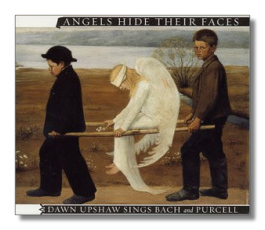
The Internet's Premier Classical Music Source
Related Links
-
Bach Reviews
Purcell Reviews - Latest Reviews
- More Reviews
-
By Composer
-
Collections
DVD & Blu-ray
Books
Concert Reviews
Articles/Interviews
Software
Audio
Search Amazon
Recommended Links
Site News
 CD Review
CD Review
Angels Hide Their Faces

- Henry Purcell:
- Music for a While
- I Attempt from Love's Sickness to Fly
- Ah! How Sweet It Is to Love
- Lord, What is Man
- Hark! How All Things
- If Music Be the Food of Love
- The Blessed Virgin's Expostulation
- An Evening Hymn
- Johann Sebastian Bach: Cantata BWV 199: Mein Herze schwimmt im Blut
Dawn Upshaw, soprano
Arthur Haas, harpsichord and organ
Myron Lutzke, cello
Peggy Pearson, oboe; others
Nonesuch 79605-2 DDD? 54:57
Three cheers for Dawn Upshaw and her flesh-and-blood interpretations of music that can be killed with respect. Angels Hide Their Faces – the title comes from the German text of Bach's cantata – is perhaps an inappropriate title, because Upshaw is hardly deferential on this disc, but that's the only thing that doesn't work for me about this release.
Upshaw's characteristically sensitive word-painting is both vivid and empathic. In Lord, What Is Man, her voice drips with disgust as she marvels, "That for a worm a God should die." When she comes to the closing "Hallelujah" section of the same song, she seems to be cheering the home team on. The Blessed Virgin's Expostulation, poet Nathan Tate's very personal depiction of Mary's bewilderment and fear when Jesus disappears in the temple, is as immediate as a revelation made to Maury Povich on national TV: "My Son thinks He's Mankind's savior!" Upshaw's plaints to the Archangel Gabriel are so anguished and real that no doubt remains that this Virgin Mary isn't just indulging in rhetoric – she expects an answer right away.
Bach's cantata, like Purcell's Lord, What Is Man, is a meditation on guilt and redemption. It also exists in an earlier version for lower voice. Here, Upshaw sings the later soprano version, and is occasionally taxed by its challengingly high tessitura. This is true particularly in the second aria, where she has moments of shrillness. Her blend with the oboe in the first aria, however, is lovely, and this is a very alertinterpretation of the cantata, its self-hating text notwithstanding.
Upshaw sings the first five Purcell songs with cello and keyboard continuo, turns her attention to the Bach cantata (with the addition four strings and an oboe), and then returns to Purcell for the last three songs. The Bach, then, is the centerpiece. The unusual layout increases the attractiveness of this CD, although I don't think it necessarily makes a great deal of musical sense.
The Purcell selections were recorded in 2000, and the Bach in 1997. I understand that Upshaw sang the latter work in one of director Peter Sellars's weird productions – DVD please! the engineering brings Upshaw's voice too close for my taste, and a few spots of distortion seem to have resulted. It's not a big problem, however. The interesting booklet note is by American composer John Harbison.
Copyright © 2001, Raymond Tuttle




















